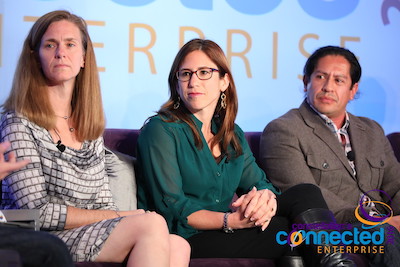
One could argue that AI and machine learning narrowly outpaced IoT as this year's hottest topic in tech. On the opening day of Constellation Research's Connected Enterprise 2016 conference, a panel of experts mulled one of the biggest questions surrounding AI: As the technology progresses, will humans become less relevant and ultimately, less employable?
This is the wrong way to think about it, said Yael Garten, director of data science at LinkedIn. “A lot of focus is how machines will replace humans. At LinkedIn, we worry about how that will affect employment globally.” But the company also is thinking about how AI can be used in conjunction with humans, she added: “How do you integrate a machine and human into a constant feedback loop to make applications better and better?'”
One challenge with AI is selling the benefits of it, said Xavier Quintuna, big data principal at Orange Silicon Valley. "It's hard to explain what AI is to executives," he said. "'Augment' is the main key word to use, to not scare anybody. If you say 'replace,' IT is going to be scared, project management is going to be scared, executives are going to be scared."
A third panelist echoed Garten and Quintuna. "AI is basically amplifying humans," said Sudhir Jha, SVP of global product management and strategy at Infosys. "In that sense, it’s no different than any technology in the past, going back to the printing press. If you look at it that way as you master [AI] you’re going to do better. If you don’t know how to use a chainsaw, you’re going to cut yourself.”
Meanwhile, it's already been shown in chess that when humans and computers work in tandem, it creates a "player" that's better than either on their own, said Jana Eggers, CEO of AI platform vendor Nara Logics. "What we don't talk about so much [in the AI discussion] is that we already have good examples of this," said. "Artificial light didn't replace the sun. AI will replace some things, but not everything completely. Now it's up to you to decide, what are the good things to replace?
Panelists considered the notion of what skills workers will need to develop over the next 5 to 10 years as AI becomes more pervasive. Whatever industry in question—construction, logistics, hospitals—the advent of AI will help automate routine tasks while freeing up workers for higher-value tasks, said Jack Berkowitz, VP of data science products at Oracle. "The key ingredient is really about reasoning," he said. "People are hopefully going to be thinking more."
